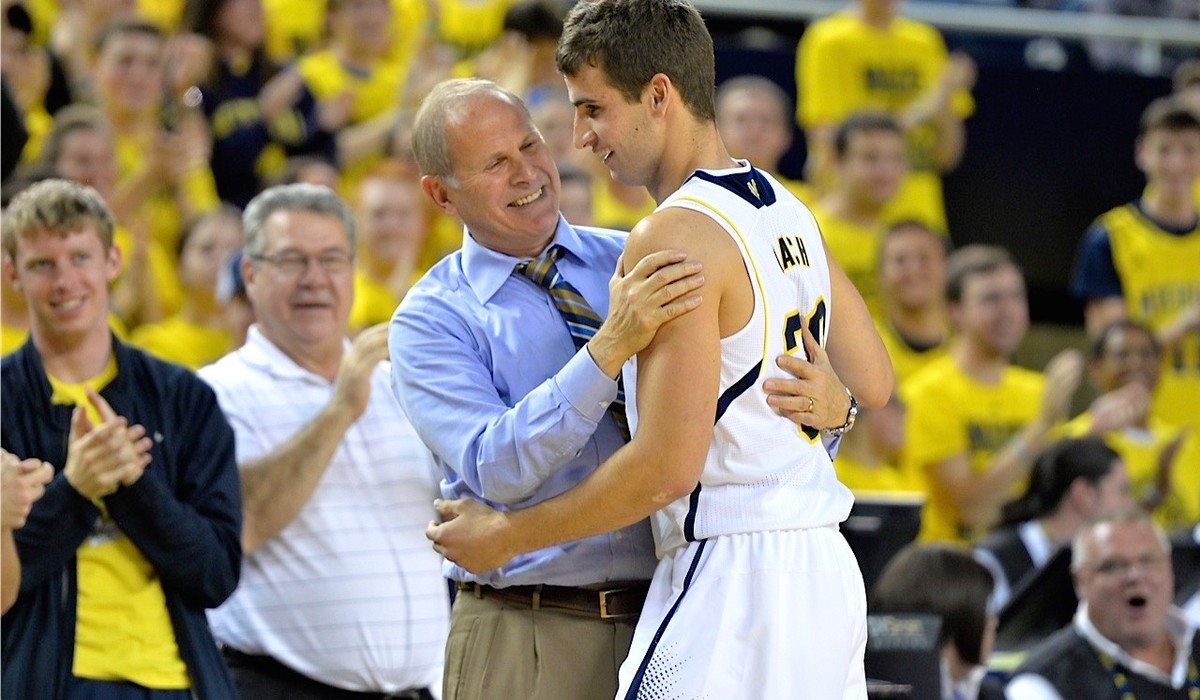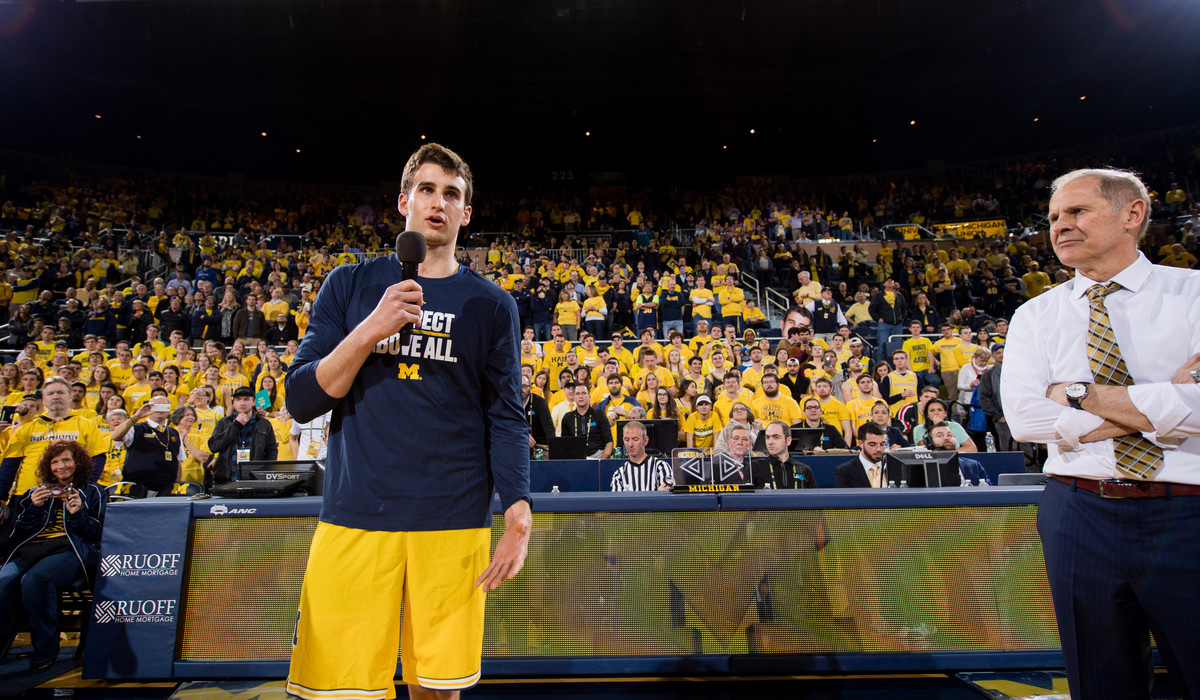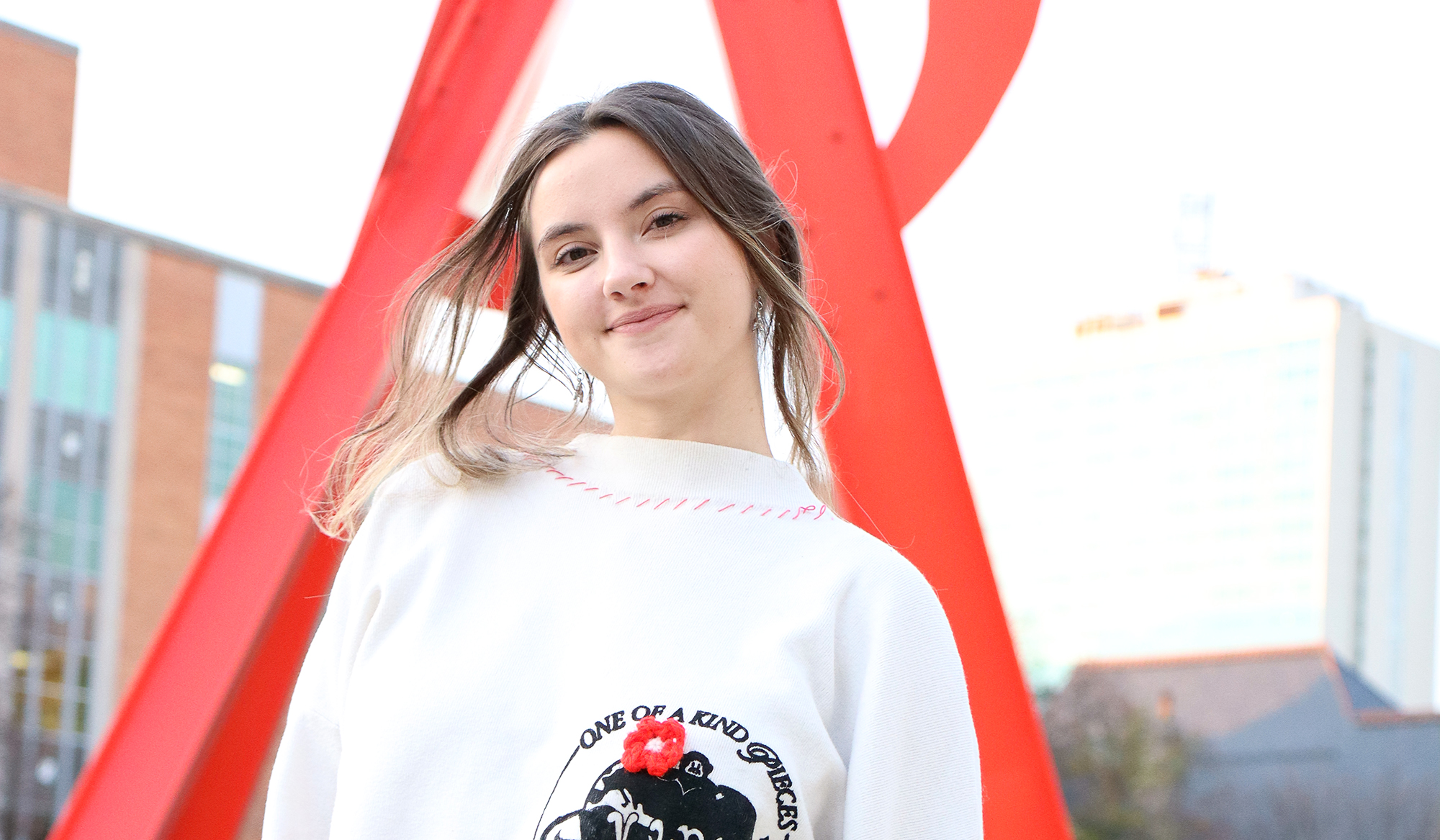Austin Hatch: A Tale of Overcoming
•
Photos courtesy of Austin Hatch
ON a wintry morning in Ann Arbor, temperatures dipping into the teens, Austin Hatch answers his phone with a warm greeting.
“Hey, how you doing?” Hatch beams. An undeniable energy emanates from behind Hatch’s welcome. It trumps the trauma of his past. It overruns any self-pity.
When ESPN produced a 16-minute feature on Hatch, then a freshman on the U-M basketball squad, in January 2015, narrator Chris Connelly described Hatch’s tale as a “journey of biblical proportions.” It wasn’t the typical hyperbole so commonplace in sports, where words like “war” and “survival” are trite, tired terms. In fact, Hatch’s story, as the ESPN segment’s title accurately noted, was indeed “Miraculous.”
And now, seven years later, Hatch’s life—his outlook, his clear purpose, and the internal peace he exhibits—serves a reminder of the human spirit’s majestic capacity to endure and triumph.

Hatch grew up a wolverines fan in Fort Wayne, Indiana, with a mother and two grandfathers who had earned degrees from U-M and possessed unrelenting affinity for the Maize and Blue.
“I was that kid put to sleep by ‘The Victors,'” Hatch says.
As a child, he regularly attended U-M football and basketball games. He also dreamed of matriculating into U-M and perhaps even competing for the Wolverines, a youthful ambition ignorant of the latter aspiration’s long odds.
On Sept. 1, 2003, an 8-year-old Hatch boarded a six-seat plane with his parents—Stephen and Julie (Siwik) Hatch, ’87—and two siblings—Lindsay, 11, and Ian, 5. After a family trip to Michigan, Stephen began piloting the family back to their Fort Wayne home. Around 8 p.m., the aircraft’s engine ceased working and the plane spiraled to the ground in Uniondale, Indiana.
In the crash’s fiery aftermath, Stephen threw Austin from the plane. He was unable to save the others, who all perished.
In tragedy, the bonds between Hatch and his father intensified. The two connected over basketball, Hatch’s “first love.” They attended father-son basketball camps together, and the trash talk flowed during driveway contests. Hatch credits his father with showing him how to prevail with courage and positivity, a concept Stephen Hatch personified with his 2005 marriage to Kimberly Neal.
“She was my second mom,” Hatch says of Neal, a single mother of three who accepted Hatch as one of her own. “How great to have two mothers who loved me.”
Hatch, meanwhile, blossomed into a sharpshooting 6-foot-6-inch forward starring at Fort Wayne’s Canterbury High, a talent attracting the attention of top college basketball programs. In February 2011, Michigan’s then-head basketball coach John Beilein visited Fort Wayne and watched Hatch, then a sophomore, drop 30 points and collect 16 rebounds in a win over Bishop Luers High School.
“I saw a Big Ten player that day,” Beilein says. “Austin controlled the game from beginning to end.”
Four months later, on June 15, Beilein offered Hatch a scholarship.
“Coach Beilein didn’t even finish the sentence before I asked him if I could commit right then,” Hatch recalls. “Playing for Michigan was the dream.”
But tragedy returned on June 24, 2011. Nine days after Hatch committed to Michigan, he and his parents set off for a vacation in northern Michigan with Stephen Hatch guiding the Beechcraft Bonanza aircraft. According to federal investigators, the single-engine plane stalled due to inadequate air speed. It crashed into a garage near the Charlevoix Municipal Airport.
This time, only Austin Hatch survived. And his injuries were substantial. Broken collarbones. Numerous fractures. Holes in his lungs. Most troubling was a traumatic brain injury. He spent six weeks in a medically induced coma. Some wondered if he would ever walk or speak again; others feared he might never wake up.
Slowly, Hatch’s condition stabilized, and his journey of physical rehabilitation began, first in Fort Wayne and then Chicago. There, Beilein, issued a special waiver by the NCAA, visited Hatch. Months earlier, Beilein had witnessed a skilled athlete overpowering a rival. That day, he witnessed a young man struggling to raise a sandwich to his mouth.
“It was sobering,” says Beilein, choking up as he recalls the memory.
Hatch moved to Los Angeles to live with his uncle, continuing an arduous march toward physical recovery and inner peace. Again, he turned to basketball, a familiar ally and special source of serenity. He embraced the idea of when, not if, he would play again.
“My dad always said, ‘Go big or go home.’ I decided to go big on my recovery and believed that if I went all in and controlled what I could control, the results would take care of themselves.”
As a senior at Loyola High School in Los Angeles, Hatch returned to the court on Jan. 8, 2014. He drained a three-point shot late in a Loyola victory.
“It felt like old times,” Hatch says. “I had so many people who contributed to my recovery. The odds may have been against me, but I was so blessed to have the support of my family, friends, doctors, nurses, and therapists who made the recovery possible. And Coach Beilein following through on his commitment to me changed my life forever.”

My journey might be more graphic and traumatic than others, but everyone has challenges. I hope I’m providing encouragement and motivation that helps others.
--Austin Hatch
Beilein and his staff never wavered in honoring Hatch’s scholarship. In fact, they welcomed him to the squad in August 2014, handing him a jersey with his name stitched above the number 30.
Against Coppin State on Dec. 22, 2014, Hatch entered the game with 1:22 remaining and the Wolverines ahead 69-48. Nineteen seconds later, Hatch was fouled attempting a three-point shot. He scored his first—and only—career point when he drained the second of three free throws.
“I’m the lowest-scoring scholarship player in Michigan history,” Hatch jokes. “That’s one for the record books.”
He spent three more seasons with the Wolverines on a medical hardship scholarship, his career culminating with Michigan’s 2018 run to the Final Four.
“Austin motivated all of us,” Beilein says. “It’s tough to whine about your circumstances when a guy like him is around working so hard.” After earning his degree in organizational studies in 2018, Hatch spent the next year and a half working at the corporate office of Domino’s Pizza. Though he tackled interesting projects, he found his heart pulled elsewhere—to schools, churches, and nonprofits who invited him to speak about his journey. In November 2019, Hatch left Domino’s to build a professional speaking career, an entrepreneurial venture he aptly named Overcome It. (For more about his venture, see the sidebar.)
“My journey might be more graphic and traumatic than others, but everyone has challenges,” he says. “I hope I’m providing encouragement and motivation that helps others.”
Being inches away from death not once, but twice, Hatch says, compels a different perspective. Rather than dwelling on his circumstances, the 27-year-old Hatch, who married former Wolverine volleyball standout Abby Cole, ’17, in 20 18, aims to prove the power of perseverance, the value of self-improvement, and the importance of living for others.
“I’ve shifted my focus to how my story can be a blessing to other people,” Hatch says. “What a gift if I can accomplish just that.”
Austin Hatch, after all, is here to live.
It Takes Grit
Austin Hatch launched his entrepreneurial venture Overcome It in 2019 and has since spoken to organizations across the country about his road to recovery and triumph. His goal is to help others overcome their challenges.
He says many things had to happen after the tragic plane crashes so he could make it to U-M and many people contributed to his journey. But more than anything, he says, it took G.R.I.T., an acronym for a Growth Mindset (viewing adversity as opportunity), the decision to be Resilient (taking massive action in the face of adversity), Integrity (following through on commitments, especially when circumstances change), and The Team First Mentality (making the effort to be the best we can be for the team). Hatch says G.R.I.T. is driven by a greater purpose, by working for something bigger than ourselves.
In 2021, Hatch took his program to 85 organizations, including the likes of Accenture, Domino’s, Ford, Prudential, and UBS. This year, a perpetual goal-setter, he aims to top 100 presentations.
DANIEL P. SMITH is an award-winning, Chicago-based journalist who has written previously for Michigan Alum about entrepreneurs such as real estate magnate Sam Zell and Five Guys Burgers & Fries founder Jerry Murrell.



